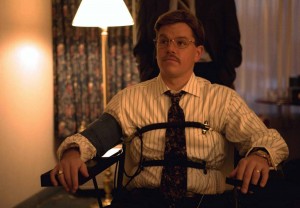The Informant!
 Being intentionally campy is a slippery slope. There are generally two polar opposites that filmmakers aim for, with John Waters and his deliberately wretched acting and fecal excess on one side and Pedro Almodovar and his brightly colored wallpaper and screaming transvestites on the other. Well, maybe there’s not a huge difference, but in terms of what Waters is after (a mix of low humor, ridiculous kitsch, and over-the-top personalities) versus what Almodovar is after (explorations of straight female and gay male sexuality, serious ethical dilemmas, surrealism, and trying to figure out why you’ve been abandoned and where you should be) is what differentiates them. Waters is silly, silly, Almodovar is serious, silly.
Being intentionally campy is a slippery slope. There are generally two polar opposites that filmmakers aim for, with John Waters and his deliberately wretched acting and fecal excess on one side and Pedro Almodovar and his brightly colored wallpaper and screaming transvestites on the other. Well, maybe there’s not a huge difference, but in terms of what Waters is after (a mix of low humor, ridiculous kitsch, and over-the-top personalities) versus what Almodovar is after (explorations of straight female and gay male sexuality, serious ethical dilemmas, surrealism, and trying to figure out why you’ve been abandoned and where you should be) is what differentiates them. Waters is silly, silly, Almodovar is serious, silly.
Director Steven Soderbergh knows how to do silly, silly (Schizopolis, my personal favorite film), serious, silly (Out of Sight), serious, serious (Traffic, Solaris), stupid, serious (Full Frontal), and even stupid, stupid (Ocean’s Twelve). Obviously, he likes to experiment with genre and tone. He even developed an almost completely transparent routine of making a film for the studio, such as the Ocean’s series, so he could make a movie he wanted to, on the cheap, like Bubble or The Girlfriend Experience. This abundant versatility has resulted in Soderbergh being given chances such as with Che, a $65 million movie on a divisive topic, four ½ hours long (eventually split into two parts), and entirely in Spanish. Conventional wisdom would tell you what a disastrous financial decision that was (even if Inglourious Basterds made money, it only had half of the above obstacles and it had a wide release), but that’s not Soderbergh’s problem, and he should be congratulated for convincing some generous soul to part with his hefty funds.
 Soderbergh’s new film The Informant!*, his third theatrically released film in the last 10 months, takes none of the chances that Che does and takes the easy way out in telling what should be a fascinating story but treating it as if it were a parody of cheesy 70s sitcoms (or a recreation of the Beastie Boys video for Sabotage). The Informant! is faintly based on the life of Marc Whitacre, played by Matt Damon, an ambitious, moralistic, and possibly bi-polar executive at an enormous agricultural production company, ADM, who risks his life, family, and career by narcing to the FBI about a worldwide price fixing scheme within ADM. But the exclamation point in the title tells you all you need to know about Soderbergh’s approach, which, combined with the burnt orange color scheme and silly haircuts and facial hair, seems to his way of distracting us from the fact that The Informant! takes places in the 1990s, not the 1970s. Granted, he is exploring Decatur, Illinois, where, like a lot of small Midwestern cities, it can easily be 20 years behind the times in fashion, music, and technology. But the way Soderbergh has gone about that exploration was to make the movie condescending about the character’s naiveté, it’s the most patronizing Hollywood movie about the middle of the USA since About Schmidt.
Soderbergh’s new film The Informant!*, his third theatrically released film in the last 10 months, takes none of the chances that Che does and takes the easy way out in telling what should be a fascinating story but treating it as if it were a parody of cheesy 70s sitcoms (or a recreation of the Beastie Boys video for Sabotage). The Informant! is faintly based on the life of Marc Whitacre, played by Matt Damon, an ambitious, moralistic, and possibly bi-polar executive at an enormous agricultural production company, ADM, who risks his life, family, and career by narcing to the FBI about a worldwide price fixing scheme within ADM. But the exclamation point in the title tells you all you need to know about Soderbergh’s approach, which, combined with the burnt orange color scheme and silly haircuts and facial hair, seems to his way of distracting us from the fact that The Informant! takes places in the 1990s, not the 1970s. Granted, he is exploring Decatur, Illinois, where, like a lot of small Midwestern cities, it can easily be 20 years behind the times in fashion, music, and technology. But the way Soderbergh has gone about that exploration was to make the movie condescending about the character’s naiveté, it’s the most patronizing Hollywood movie about the middle of the USA since About Schmidt.
 However, About Schmidt had many attributes, if you could ignore the tone, specifically Jack Nicholson’s performance, and The Informant! has Matt Damon being energetically foolish, and gives him a rambling interior monologue that hilariously goes over the minutia and worries of his day. Of his need to be efficient about his time he says, “I’ll even floss in the shower while conditioning my hair.” The way Whitacre’s mind is distracted helps explain a lot about how unraveled his life became as the FBI investigation goes on long enough for him to begin really losing his marbles. His FBI colleagues, played by Scott Bakula and Joel McHale, are sensitive to the danger Whitacre is putting himself in (“you can talk to us about your feelings”). But no matter how much Whitacre tries to reassure himself about the quality tapes and video footage he’s obtained, he never understands the bigger picture. Even if these sections are based on fact, stuff like his wife’s beehive haircut and the fact that he thinks that he’ll still have a job after everyone above him is prosecuted stretch credibility.
However, About Schmidt had many attributes, if you could ignore the tone, specifically Jack Nicholson’s performance, and The Informant! has Matt Damon being energetically foolish, and gives him a rambling interior monologue that hilariously goes over the minutia and worries of his day. Of his need to be efficient about his time he says, “I’ll even floss in the shower while conditioning my hair.” The way Whitacre’s mind is distracted helps explain a lot about how unraveled his life became as the FBI investigation goes on long enough for him to begin really losing his marbles. His FBI colleagues, played by Scott Bakula and Joel McHale, are sensitive to the danger Whitacre is putting himself in (“you can talk to us about your feelings”). But no matter how much Whitacre tries to reassure himself about the quality tapes and video footage he’s obtained, he never understands the bigger picture. Even if these sections are based on fact, stuff like his wife’s beehive haircut and the fact that he thinks that he’ll still have a job after everyone above him is prosecuted stretch credibility.
Perhaps as a counterpoint to the logical problems, Soderbergh chose to cast virtually every other supporting part of the film, and there are a lot of supporting parts, with stand-up comics (Patton Oswalt, Allan Havey, Dana Gould, Tom Papa, The Smothers Brothers, etc.), and have them play dramatic parts, giving all the funny lines to Matt Damon. This odd juxtaposition is a distraction, and it helps lessen the impact of the irony hammer weighing over every scene. It helps that none of the comics shame themselves in their performances, which makes the overall message of the film, that it’s always better to just abide by the status quo, considerably more amusing. These comics have spent their entire careers struggling on stage in small clubs, getting heckled and underpaid. They finally get their break as the wacky best friend on a sitcom or an HBO stand-up special, and they’re ready to show the world their comic chops in a big budget movie. When, after hundreds of auditions, that opportunity arises, the director tells them they’re in the movie, only they’re not to be funny, at all. You wonder if all the comics had secret meetings on the set of The Informant! trying to find ways to blackmail Soderbergh into giving Whitacre a wacky best friend for them to play.
 * The Informant!, like all Soderbergh films, has one very specific theme and idea he’s trying to get across. It’s so prevalent in every single one of his films (more than 25) that it must be his personal mantra. What each of his films share is that they all concern someone who thinks they are being honest about being a liar (whether through criminal activity, corporate intrigue, or social communication) being outsmarted or taken advantage of by someone who has no qualms about being a liar who lies about it.
* The Informant!, like all Soderbergh films, has one very specific theme and idea he’s trying to get across. It’s so prevalent in every single one of his films (more than 25) that it must be his personal mantra. What each of his films share is that they all concern someone who thinks they are being honest about being a liar (whether through criminal activity, corporate intrigue, or social communication) being outsmarted or taken advantage of by someone who has no qualms about being a liar who lies about it.



